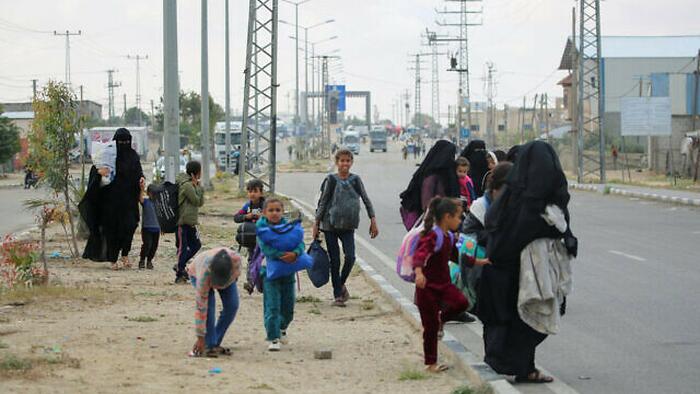


The last several hours have seen a significant escalation of the situation in the southern Gaza city of Rafah, sending Western diplomats scrambling and resulting in new threats and counterthreats between Hamas and Israeli leaders.
The Israel Defense Forces (IDF) have urged many thousands of Palestinian civilians to urgently evacuate ahead of an impending ground offensive. In the overnight hours Israeli Defense Minister Yoav Gallant told US Secretary of Defense Lloyd Austin that Israel now believes it has no choice but the carry on with the major ground operation, despite it having been stalled for months.
Gallant cited that a Hamas rocket attack was carried out from Rafah, killing four Israeli soldiers. Airstrikes in eastern Rafah have already begun, and residents and refugees there are being dropped flyers - and homes are also reportedly receiving urgent messages - telling them to evacuate immediately.
An expanded humanitarian zone is being set up by the IDF in the vicinity of the al-Mawasi and Khan Younis areas of southern Gaza.
"Driving through Rafah, the tension was palpable with people evacuating as rapidly as they could," a British humanitarian health workers was cited by Al Jazeera as saying.
The IDF is calling this a "limited scope operation" - with army spokesman Lt. Col. Nadav Shoshani describing that for now 100,000 people were being ordered to move to the humanitarian zone. The army has further issued a map of the evacuation area and 'safe zones'.
A military statement said that "in accordance with the approval of the political echelon, the IDF calls on the population, which is under the control of Hamas, to temporarily evacuate from the eastern neighborhoods of Rafah to the expanded humanitarian zone."
"This matter will progress gradually, according to an ongoing assessment of the situation," it added. "The IDF will continue to pursue Hamas everywhere in Gaza until all the hostages that they’re holding in captivity are back home."
As for the tens of thousands of warning flyers currently being dropped, one reads: "Anyone found near (militant) organizations endangers themselves and their family members. For your safety, the (army) urges you to evacuate immediately to the expanded humanitarian area."
And the flyers further stipulate: "It is prohibited to come near to the eastern and southern security fences." Humanitarian aid organizations, including the UN and some Western governments have warned that an all-out assault on Rafah, which has swelled during the war to some 1.5 million people (mostly internally displaced refugees), will be a humanitarian catastrophe.
There are also fears that at a moment CIA director William Burns is in the region trying to salvage negotiations toward reaching a hostage return deal, any hope for a truce will dashed by the Rafah operation.
But so far, Hamas as indicated it is still committed to the talks. "We will continue the negotiations positively and with an open heart," Hamas spokesman Abdul Latif al-Qanou told AFP. He said an agreement is still needed "for a permanent ceasefire and the fulfilment of the demands of our people." But Prime Minister Netanyahu has not backed off his ultimate aim of seeing the total eradication of Hamas complete, which requires going after the remaining battalions in Rafah city. According to Israeli media:
Israeli officials have said the terror group has six remaining battalions in the Gaza Strip, four of them in Rafah: Yabna (South), Shaboura (North), Tel Sultan (West) and East Rafah. Two more Hamas battalions remain in central Gaza, in the Nuseirat and Deir al-Balah camps.
Hamas is meanwhile warning in a fresh reaction statement to the IDF preparing its long awaited offensive that it will not be a "picnic" for Israeli forces. "Our valiant resistance, led by al-Qassam Brigades, is fully prepared to defend our people," the group said of its armed wing.
As expected, this has triggered some pushback against Netanyahu both locally and internationally. Israeli opposition leader Yair Lapid slammed it as irresponsible, saying that in effect the Netanyahu government has "abandoned" the captives.
France is among the first countries Monday to warn against the Rafah attack, with French President Emmanuel Macron holding a phone call with Netanyahu. Macron stated his firm opposition to a ground offensive and encouraged a ceasefire instead. In late March, Macron had actually warned that forced transfer of civilians from Rafah could be a "war crime".
IDF flyers dropped over Rafah on Monday:
Likely sensing that Netanyahu would not halt military plans for a Gaza invasion, it's been widely reported that for the first time the Biden administration has put a hold on a shipment of US-made ammunition which was bound for Israel.
The revelation came in a Sunday report by Axios, confirmed by two Israeli officials. "The incident raised serious concerns inside the Israeli government and sent officials scrambling to understand why the shipment was held, Israeli officials said," Axios reported.
Campus protests are likely to grow fiercer in light of a Rafah attack. "President Biden is facing sharp criticism among Americans who oppose his support of Israel," the report noted. "The administration in February asked Israel to provide assurances that U.S.-made weapons were being used by Israel Defense Forces in Gaza in accordance with international law. Israel provided a signed letter of assurances in March."
Below area some further geopolitical headlines Monday morning...
Geopolitics: Middle East
Geopolitics:
